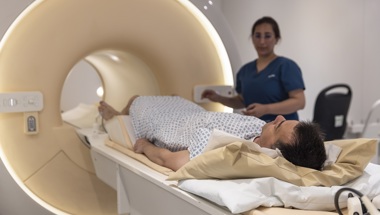Research
11 Mar 2025Our £2m trial to test whether this new scan could stop high-risk prostate cancer from spreading
The trial will test whether the new, more accurate scan can give men the targeted treatment they need to stop the spread of prostate cancer.

A new kind of scan that could enable men with high-risk prostate cancer to get better, more personalised treatment is set to be tested in a £1.89 million clinical trial we're launching today.
The trial, called AVIDITY, will look at whether men diagnosed with high-risk prostate cancer do better when their treatment is based on the new, more detailed scan.
Unlike existing tests, the scan can pick up microscopic amounts of the disease that spread beyond a man's prostate – which, if left untreated, can continue to grow.
With the current scans, men whose cancer has spread may miss out on vital extra treatment that could stop this happening. And at the same time, men whose cancer hasn't spread may receive unnecessary treatment 'just in case' - which can cause lifechanging side effects.
The new scan, called PSMA PET/CT, could therefore be the tool that enables the accurate diagnosis men need – and the AVIDITY trial will tell us whether it improves treatment for the thousands of men diagnosed with this type of prostate cancer every year.
By combining the best of the CT and bone scans that we use now and following the men on this trial over time, we’ll be able to tell which scanning method is best for controlling cancer spread. This could vastly improve treatments for men with high-risk prostate cancers.
The challenge of existing scans for prostate cancer
When a man is diagnosed with prostate cancer, doctors can look at his biopsy to see whether the cancer is aggressive and likely to spread outside the prostate. This is called high-risk prostate cancer.
But what the biopsy can't tell us is whether the cancer has already spread and so needs further treatment, such as hormone therapy.
Instead, doctors use two separate imaging tests: a CT scan (which takes detailed pictures of the inside of a man’s body) and a bone scan (which looks for cancer in his bones).
Unfortunately, these two scans aren't perfect. They can miss small amounts of cancer that have spread, meaning men and their doctors may base their decisions on incomplete information.
That's where PSMA PET/CT scanning comes in. It uses a special dye that’s injected into the body and seeks out prostate cancer cells, making them easier to spot on a scan.

Striking the right balance
Research shows PSMA PET/CT scans can help doctors see more of cancer’s spread – but we don’t yet have the definitive evidence that basing treatment plans on it is better for men with the disease.
That’s because, as with all diagnostic tests, doctors have to balance the risks of under- and over-treatment.
For example, for men whose cancer has spread, PSMA PET/CT scans could lead to lifesaving treatment. And for men whose cancer hasn’t spread, the scan could help them avoid unnecessary treatment and experience fewer side effects.
On the other hand, the greater accuracy of PSMA PET/CT could help doctors spot cases where the disease may be spreading but not quickly enough to cause problems. This could mean he undergoes extra treatment, and more side effects, for no benefit.
What’s more, men who find they do have cancer spread beyond their prostate thanks to PSMA PET/CT may no longer be eligible to have their prostate removed, or to have prostate radiotherapy – two treatments that are extremely effective – which would drastically limit their treatment options.
Receiving funding from Prostate Cancer UK is allowing us to undertake this crucial work, which could see a change to standard methods of imaging and result in men receiving more personalised treatment plans.
Getting the evidence we need
That difficult balance is why men and their doctors need the AVIDITY trial, to help them weigh up these potential benefits and drawbacks.
Led by Professor Hashim Ahmed of Imperial College London, AVIDITY will recruit more than 1,000 men with high-risk prostate cancer from around the UK. Half will receive a CT scan and a bone scan, and the other will receive the new PSMA PET/CT scan. Both groups will have their cancer treatment decisions made based on their imaging results.
The researchers will then follow up with these men two years and four years after the first scan to see if their cancer has spread further.
If the new scan proves more effective, it could become the standard method for guiding treatment decisions about high-risk cancer, reducing the risk of the disease coming back.
If not, both men and their doctors can be reassured that the current scans and treatment plans are good enough at picking up the spread of prostate cancer – without the extra cost to the NHS of introducing new scans.
‘Either way, men benefit’
Professor Ahmed, who is Chair of Urology at Imperial College London, said: “A study like AVIDITY is needed to show that the new imaging test really does make a difference. If it does, it can be used in all men. If it doesn’t, we’ll have avoided diverting valuable resources to something that's not useful. Either way, men benefit.
“Receiving funding from Prostate Cancer UK is allowing us to undertake this crucial work, which could see a change to standard methods of imaging and result in men receiving more personalised treatment plans. We hope that the trial will show us the best way to image high-risk cancers, and if current methods need to change.”

Potential to vastly improve treatment for men
Dr Matthew Hobbs, our Director of Research, said: “Knowing that your prostate cancer is likely to spread can be deeply unsettling. Men in this situation need certainty that they are going to get the best treatments at the right time based on their actual cancer, as preventing spread is likely to remove the possibility that prostate cancer will become terminal.
“Unfortunately, the current way we assess high-risk prostate cancers is imperfect, and means some men will have cancer spread that hasn’t been detected, and other men will get treatments they don't need, which can cause challenging side effects.
“We expect this could be a groundbreaking piece of work, as by combining the best of the CT and bone scans that we use now and following the men on this trial over time, we’ll be able to tell which scanning method is best for controlling cancer spread. This could vastly improve treatments for men with high-risk prostate cancers.”







